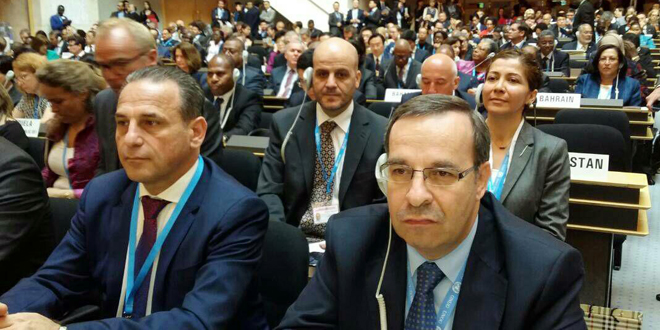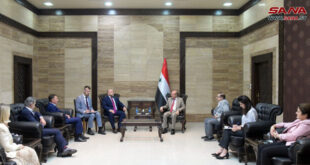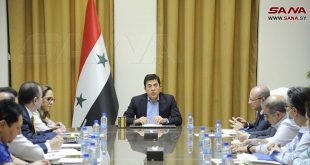Geneva, SANA – Health Minister Nizar Yazigi discussed with Regional Director for the Eastern Mediterranean Region at the World Health Organization (WHO) Mahmoud Fikri cooperation between the Ministry and the Organization.
During the meeting, Yazigi reviewed the current health situation in Syria and the Ministry’s efforts to provide citizensl with preventative, curative, and emergency health services at a high level and without discrimination.
The Minister called on the WHO to work towards lifting the unjust and coercive sanctions imposed on the Syrian people due to their negative impact on the Ministry’s efforts to provide the Syrian people’s medical needs, particularly in terms of importing medicine, vaccines, medical equipment, and spare parts.
He also called on the WHO to exert further efforts in supporting the Ministry’s work in rehabilitating hospitals and health centers damaged by terrorist acts, and to provide the health sector in Syria with medicine, particularly for health conditions related to immunity, hereditary, and tumors, along with other types of medicine not produced locally, in addition to medical equipment and spare parts for them.
For his part, Fikri lauded the Ministry’s efforts to meet the growing health needs of the Syrian population, voicing the WHO’s readiness to support these efforts further.
The meeting was held on the sideline of the 70th World Health Assembly which started its activities on Monday at the UN headquarters in Geneva with the participation of 194 states including Syria, in addition to representatives of non-governmental organizations, international bodies and donors.
The agenda of the Assembly, which will last till the end of May, includes the election of a new Director-General of the WHO, in addition to discussing regulatory and financial issues along with a number of health issues.
Participants in the activities of the Assembly will also discuss the health situation in occupied Palestine and in the occupied Syrian Golan, in addition to the progress achieved by the sustainable development plan for the year 2030 and the international strategy regarding the health of women, children and teenagers.
Heading the Syrian delegation to Geneva, Minister Yazigi told SANA that the current Assembly will focus on establishing better health systems in the age of lasting development.
The Minister stressed that the health system in Syria has proved its technical efficiency in meeting the health demands of the citizens despite the challenges imposed by the crisis in Syria over the past seven years.
He added that the health sector in Syria was targeted in a systematic way, and despite that it continued to provide the medical services, medicines and vaccines for the citizens in a way that reflects the keenness of the government on guaranteeing a good health situation for the citizens.
The World Health Assembly is the decision-making body of WHO. It is attended by all WHO Member States and focuses on a health agenda prepared by the Executive Board. The main functions of the World Health Assembly are to determine the policies of WHO, appoint the Director-General, supervise financial policies, and review and approve the proposed program budget. The World Health Assembly is held annually in Geneva.
R.J/Ghossoun / Hazem Sabbagh
 Syrian Arab News Agency S A N A
Syrian Arab News Agency S A N A




